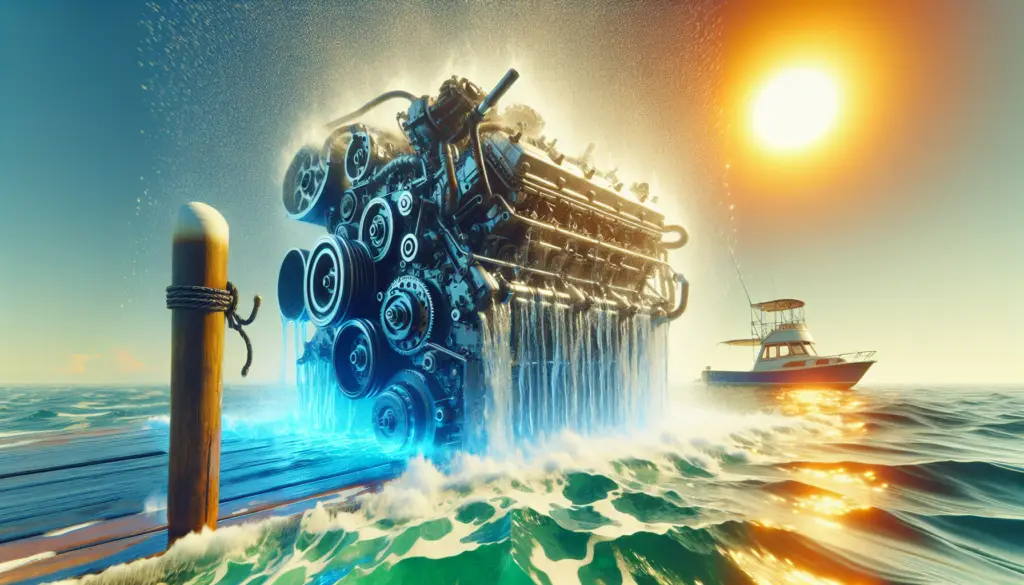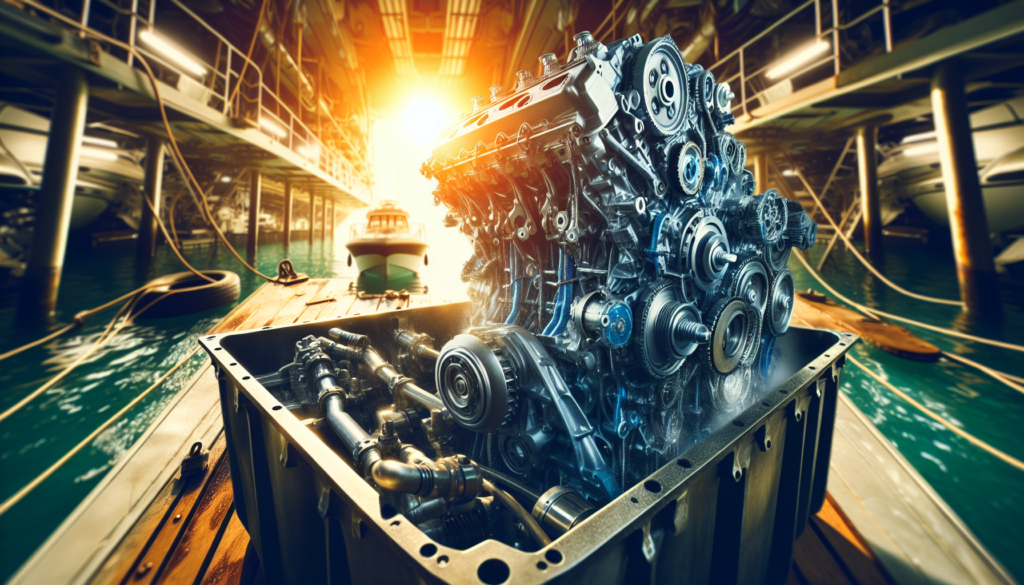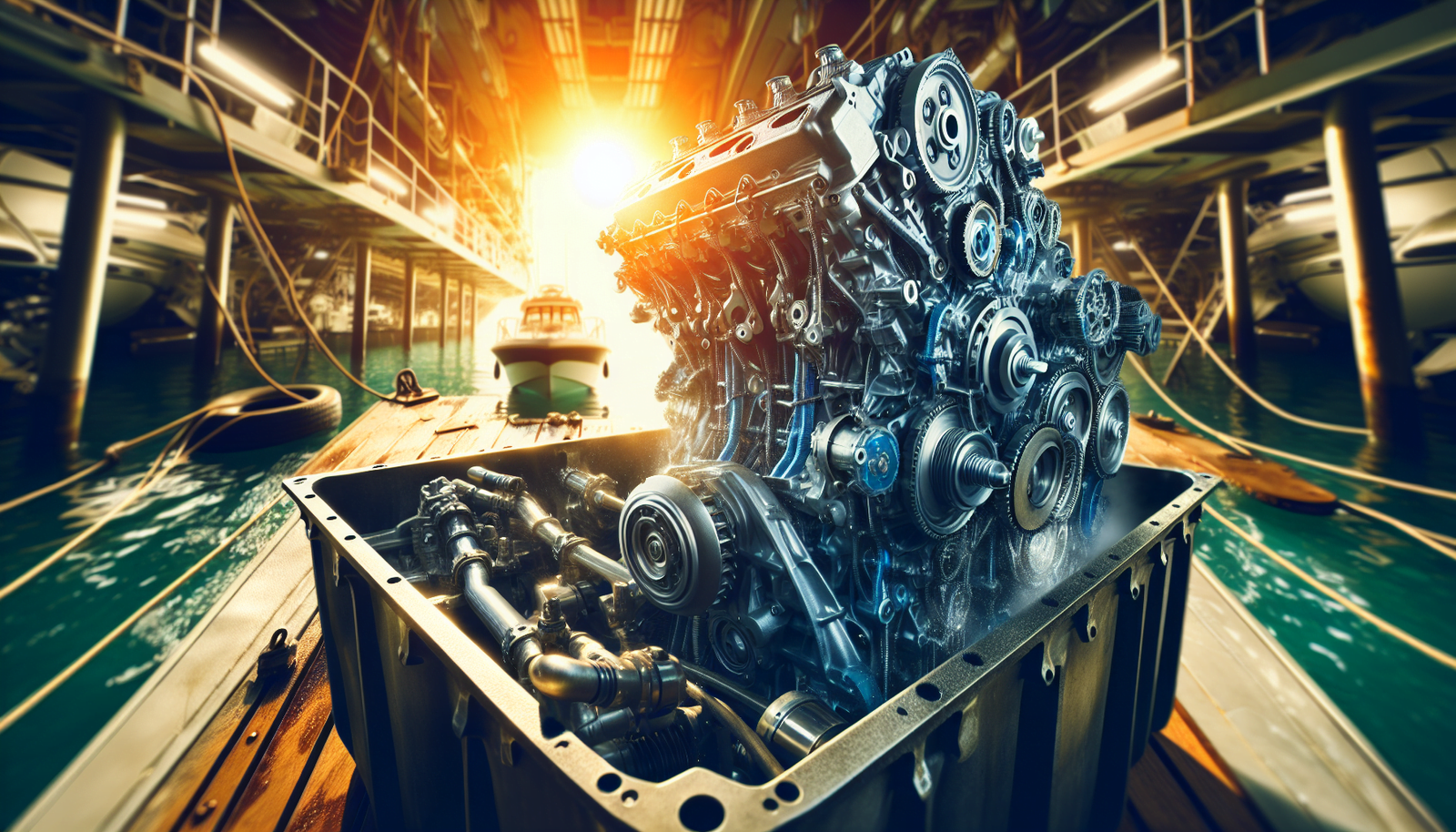Nothing beats a day on the water, especially when it’s hot out. Yet there’s a catch, high temperatures can take a toll on your boat’s engine performance. In “Tips For Maintaining Boat Engine Performance In Hot Weather,” you’ll find invaluable advice on how to keep your boat’s engine running smoothly even when the mercury’s soaring. This is your quintessential guide to finding balance between enjoyment and maintenance, from understanding the unique demands placed on your engine in sweltering conditions to proactively implementing preventive measures. By the end of it, you’ll feel better equipped to face the summer months on the water.

Understanding the Impact of Hot Weather on Boat Engine
In hot weather, operating any vehicle, including boats, can come with various challenges. It’s crucial that you fully understand how high temperatures can directly impact your boat engine’s performance and longevity.
The effect of high temperatures on boat engine
Like all mechanical systems, boat engines are designed to operate within a certain temperature range. When the ambient temperature increases, it can severely affect the engine’s performance. High temperatures can cause your engine to overheat, which can lead to mechanical failures, from minor to catastrophic. Overheating can also make your engine oil less effective, which may further exacerbate the problem.
Common indications of overheated boat engine
There are several tell-tale signs that your boat engine may be overheating. Excessive steam or smoke, a hot hood, a higher than normal temperature gauge reading, or an abnormal smell are some of the most common indications. You may also notice a decrease in engine power and performance, or your engine may shut down completely if it becomes too hot.
Impact on the engine’s performance efficiency
When an engine is running hotter than normal, it’s operating efficiency decreases. This is because the engine has to work harder to maintain its performance, resulting in increased wear and tear, reduced fuel efficiency, and a shorter engine life. In extreme cases, overheating can lead to engine seizure or even a complete engine breakdown.
Regular Inspection and Maintenance
A key to maintaining your boat engine’s performance in any weather, especially hot weather, is regular inspection and maintenance.
Importance of routine engine checks
Routine engine checks can help identify potential problems before they become significant issues. Monitoring temperature gauges, checking oil and coolant levels, inspecting for leaks, and listening for unusual noises can help you catch problems early.
Areas to focus on during inspection
While it’s important to check the entire engine, focus on areas particularly susceptible to heat damage. These include the engine block, the cooling system, the oil system, and the exhaust system. Beware of any anomalies such as leaks, unusual noises, or signs of fatigue or damage.
Scheduled maintenance: A preventive measure
Beyond daily or weekly checks, scheduled maintenance is crucial to preventively addressing potential issues. This can involve changing the engine oil, replacing worn-out parts, checking the cooling system for blockage, and more.
Proper Engine Ventilation
As heat rises in temperature, ensuring that your boat engine receives proper ventilation becomes even more critical.
The need for effective engine ventilation
A properly ventilated engine bay helps prevent the accumulation of heat, reducing the risk of overheating. It also improves combustion efficiency, as adequate oxygen is essential for fuel burning, leading to better engine performance.
Methods to improve boat engine ventilation
Keeping the engine bay clean, ensuring the vents are unobstructed, using a fan or blower to increase air circulation, and installing a custom ventilation solution are effective methods to improve ventilation.
Signs of poor ventilation
Signs of poor engine ventilation can include persistent overheating, reduced performance, foul smells, or an unusually hot engine bay.

Engine Oil and Coolant Checks
Importance of maintaining optimal engine oil level
Engine oil plays a key role in cooling and lubricating engine parts. Maintaining an optimal oil level ensures that the engine operates smoothly and efficiently, even in hot weather.
Effects of wrong or inadequate engine oil
Using incorrect engine oil or running with inadequate oil can lead to increased friction, causing the engine to overheat. It can also accelerate the wear and tear of engine parts.
Regularly monitoring and replacing coolant
Coolant plays a critical role in heat management. By circulating around the engine block, it absorbs heat and carries it away, preventing overheating. Regularly monitoring and replacing the coolant, according to the manufacturer’s guidelines, can help maintain optimal engine performance in hot weather.
Throttle Management
Understanding and implementing proper throttle management can also considerably affect your boat engine performance.
Understanding throttle management
Throttle management isn’t just about controlling the speed of your boat. It’s also about knowing how to operate your boat’s engine under various conditions. Effectively controlling the throttle will ensure that your boat’s engine doesn’t overheat and underperform in hot weather.
Effects of excessive throttling on the engine
Excessive throttling can cause your engine to work harder than necessary, leading to faster wear and tear. It can also result in inefficient fuel consumption and exacerbate the effects of overheating in hot weather.
Tips for proper throttling in high temperatures
Avoiding sudden accelerations, maintaining a steady throttle, and understanding how your boat’s hull design affects performance can help maintain the engine’s performance and longevity.
External Engine Cleaning
Another important aspect of boat engine maintenance is keeping it clean, especially the engine exterior.
Benefits of external engine cleaning
While it might seem superficial, keeping your engine externally clean can significantly improve its performance. It helps in effective heat dissipation, prevents the accumulation of dirt or salt that can lead to rusting or corrosion, and makes it easier to identify any leaks or damage.
Proper washing and rinsing techniques
When cleaning the engine, avoid using high-pressure water, as it can force debris into the engine. Use a gentle stream of water to rinse it down, and a mild detergent or degreaser for tough stains. Dry the engine thoroughly to prevent water spots or rusting and lubricate moving parts after cleaning.
Addressing hard-to-remove grime and crud
Hard-to-remove grime and crud can be difficult to clean without professional help. However, using a narrow brush to scrub areas not accessible with a standard cloth or sponge can help. Use a degreaser or dedicated engine cleaner for stubborn stains.
Maintaining Fuel System
Maintaining your boat’s fuel system is another crucial aspect of keeping your engine running smooth.
Understanding the role of fuel system in engine performance
The fuel system plays a key role in engine performance. It delivers the right amount of fuel to the engine, aiding in combustion and resulting in power generation. In hot weather, fuels can evaporate quickly, which may lead to fuel system issues.
Tips for maintaining boat’s fuel system in hot weather
Regular inspection of fuel lines, keeping the tank full, and using a fuel stabilizer can help maintain the fuel system performance in hot weather. It’s also advised to be mindful of the octane level of the fuel you’re using, as high temperatures can cause lower octane fuels to ignite prematurely.
Dealing with common fuel system issues
Common issues such as leaking fuel lines, erratic engine performance, difficulty starting the engine, and poor fuel economy can indicate fuel system issues. If these symptoms persist despite your maintenance efforts, it might be time to invite a professional to inspect the system.
Air Filter Maintenance
The air filter is an essential part of your boat engine that requires consistent attention.
Understanding the role of air filters in an engine
Air filters prevent dust and foreign particles from entering the engine, ensuring clean air for the combustion process. When operating in hot environments, the chance of dust and debris accumulation is high, which makes maintaining the air filter even more critical.
When and how to replace boat engine air filters
Replace air filters at the manufacturer’s recommended intervals or if they appear dirty or damaged. To replace the air filter, remove the old one, clean the filter housing, and install the fresh filter.
Impact of clogged air filters on engine performance
Clogged air filters can lead to poor engine performance, higher fuel consumption, and could potentially harm other components of the engine. They restrict airflow, leading to an inadequate air-fuel mixture, hampering combustion efficiency.
Managing Boat Propeller
The propeller of your boat, while not a part of the engine directly, plays a significant role in your engine’s performance.
Role of the propeller in engine performance
The propeller converts the engine’s mechanical power into thrust. A properly maintained propeller ensures efficient and consistent performance of your boat.
Signs of propeller issues
Signs of propeller issues include decreased top speed, difficulty in getting the boat to plane, excessive vibration, and increased fuel consumption. These symptoms often indicate damage to the propeller, such as dings, distortions, or significant wear.
Tips for propeller maintenance and repair
Regularly inspect your propeller for signs of damage. Small nicks or dings can be addressed with a file, while bigger issues may require professional repair or the propeller replacement.
Professional Help and Services
Even with proper maintenance and care, you may encounter situations where you need professional assistance.
When to seek professional help
Seek professional help if your diagnosis and basic maintenance efforts do not improve your boat engine’s performance, particularly if the engine is overheating, making unusual sounds, or showing signs of severe wear and tear.
Benefits of professional engine maintenance services
professional engine maintenance services go beyond basic care, ensuring your engine performs optimally. They have specialized tools and skills to identify and repair issues, ensuring that your engine serves you reliably for years to come.
Choosing a reliable service provider
When choosing a service provider, consider their experience, certification, reputation, and customer reviews. A reliable service provider will offer quality services, including transparent pricing and warranty on their work.
Remember, maintaining your boat engine in hot weather demands diligence and an understanding of your boat’s needs. By following these tips, you can ensure your boat continues to perform optimally even in the hottest weather.

